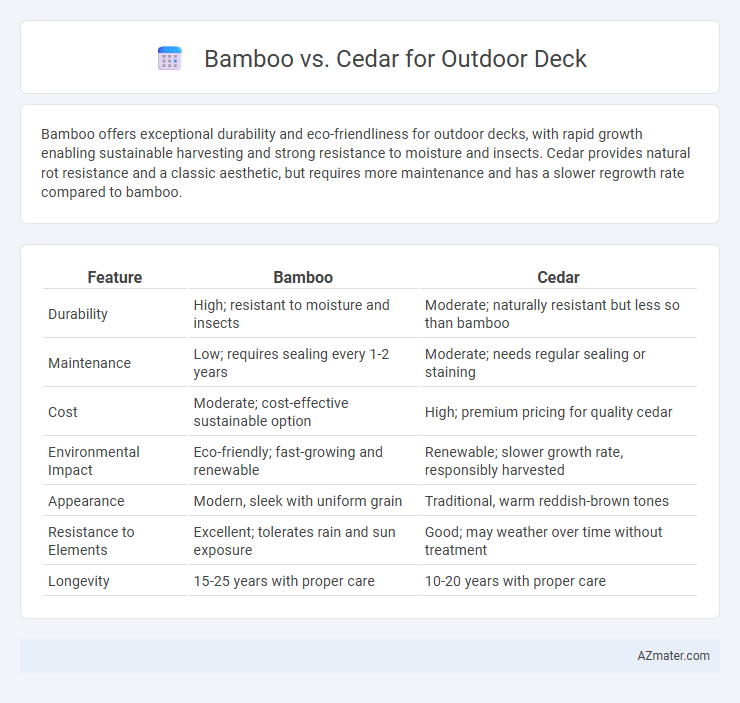Bamboo offers exceptional durability and eco-friendliness for outdoor decks, with rapid growth enabling sustainable harvesting and strong resistance to moisture and insects. Cedar provides natural rot resistance and a classic aesthetic, but requires more maintenance and has a slower regrowth rate compared to bamboo.
Table of Comparison
| Feature | Bamboo | Cedar |
|---|---|---|
| Durability | High; resistant to moisture and insects | Moderate; naturally resistant but less so than bamboo |
| Maintenance | Low; requires sealing every 1-2 years | Moderate; needs regular sealing or staining |
| Cost | Moderate; cost-effective sustainable option | High; premium pricing for quality cedar |
| Environmental Impact | Eco-friendly; fast-growing and renewable | Renewable; slower growth rate, responsibly harvested |
| Appearance | Modern, sleek with uniform grain | Traditional, warm reddish-brown tones |
| Resistance to Elements | Excellent; tolerates rain and sun exposure | Good; may weather over time without treatment |
| Longevity | 15-25 years with proper care | 10-20 years with proper care |
Introduction: Bamboo vs Cedar Decking
Bamboo and cedar are popular materials for outdoor decking, each offering unique benefits in durability and aesthetic appeal. Bamboo decking provides exceptional hardness and resistance to wear, making it suitable for high-traffic areas, while cedar is naturally resistant to decay and insect damage, ensuring long-lasting performance. Selecting between bamboo and cedar depends on factors like maintenance preferences, environmental impact, and desired deck appearance.
Durability Comparison: Bamboo and Cedar
Bamboo and cedar both offer notable durability for outdoor decking, but bamboo stands out with its exceptional hardness and resistance to moisture, insects, and rot. Cedar naturally contains oils that deter decay and insect damage, making it a long-lasting option, though generally softer and more prone to denting than bamboo. When comparing overall lifespan, properly treated bamboo decking can last 20-25 years, while cedar decks typically endure 15-20 years with regular maintenance.
Weather Resistance: Which Performs Better?
Bamboo and cedar both offer unique advantages in weather resistance for outdoor decks, with cedar naturally containing oils that repel moisture, resist insects, and withstand rot, making it highly durable in various climates. Bamboo, especially when treated and compressed into engineered decking, provides excellent hardness and resistance to warping and cracking but requires proper sealing to maintain performance in wet conditions. Overall, cedar generally performs better in prolonged exposure to weather due to its natural preservatives, while bamboo offers superior hardness but depends on treatment for optimal weather resistance.
Eco-Friendliness and Sustainability
Bamboo is a highly sustainable choice for outdoor decks due to its rapid growth rate and ability to regenerate quickly without replanting, making it an eco-friendly alternative to traditional hardwoods. Cedar, while naturally resistant to rot and pests, grows much slower and requires more time to replenish, impacting its long-term sustainability profile. Choosing bamboo supports reduced deforestation and carbon footprint, whereas cedar's durability still demands careful forest management practices to ensure environmental balance.
Maintenance Requirements
Bamboo decks require regular sealing and cleaning to prevent moisture absorption and mold growth, ensuring longevity in outdoor environments. Cedar decks are naturally resistant to rot and insects but benefit from periodic staining or sealing to maintain color and protect against weathering. Both materials demand consistent upkeep, with bamboo needing more frequent treatments to preserve its durability compared to the relatively low-maintenance cedar.
Installation Process Differences
Bamboo decking typically requires prefabricated panels or planks that are easy to cut and fasten, making installation quicker and often less labor-intensive compared to cedar. Cedar boards need careful spacing and more precise nailing or screwing to prevent warping and allow for natural expansion and contraction. Both materials benefit from proper subfloor preparation, but bamboo's uniformity and modern manufacturing simplify alignment and fastening steps during installation.
Cost Analysis: Bamboo vs Cedar Decks
Bamboo decks typically cost between $5 to $9 per square foot, offering a budget-friendly alternative to cedar, which ranges from $15 to $30 per square foot due to its natural durability and aesthetic appeal. Maintenance expenses for bamboo are generally lower since it is highly resistant to moisture and insects, whereas cedar requires regular sealing and treatment to prevent rot and warping. Considering long-term costs, bamboo's rapid renewability and eco-friendly profile often translate to more affordable installation and upkeep compared to the premium price and maintenance demands of cedar decks.
Aesthetic Appeal and Design Options
Bamboo offers a sleek, contemporary aesthetic with its smooth, uniform grain and light color that easily adapts to modern deck designs, while cedar boasts a warm, rich reddish-brown hue and natural knots that enhance rustic and traditional outdoor spaces. Bamboo's flexibility in shaping and finishing allows for diverse design options including curved structures and intricate patterns, whereas cedar's durability and natural oils provide resistance to decay, making it ideal for long-lasting, classic deck styles. Both materials bring distinct visual and structural qualities, with bamboo favoring minimalist, eco-friendly aesthetics and cedar excelling in timeless, natural beauty.
Lifespan and Long-Term Performance
Bamboo decking offers a lifespan of approximately 15 to 25 years when properly maintained, exhibiting impressive durability and resistance to moisture and insects. Cedar wood typically lasts 20 to 30 years, known for its natural resistance to rot and decay, but requires regular sealing to maintain performance. Both materials provide strong long-term performance, with bamboo excelling in eco-friendliness and rapid renewal, while cedar offers superior natural weather resistance and a classic aesthetic.
Final Verdict: Best Choice for Outdoor Decking
Bamboo offers exceptional durability, rapid growth, and eco-friendly benefits, making it a sustainable choice for outdoor decking. Cedar provides natural resistance to moisture, insects, and decay with a warm, classic look that requires less maintenance. For long-lasting, environmentally conscious decking with modern appeal, bamboo is the best choice, while cedar remains ideal for those prioritizing natural aesthetics and ease of upkeep.

Infographic: Bamboo vs Cedar for Outdoor Deck
 azmater.com
azmater.com